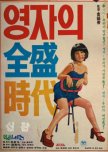"Ones that take away and leave nothing."
영자의 전성시대 appears in the introduction episode of the drama Oasis, so while watching I tried to imagine I was a school student who sneaked through the back door with friends to watch the age restricted movie. Jeong Shin was crying at the scene of the kiss from the different sides of the bars, and here are my brief thoughts on her thoughts.
🔸️The movie was produced in 1974, the years of student and Christian protests against the Yushin Constitution that gave the president the unlimited power. There were 4 emergency decrees proclaimed that year that allowed to use the death penalty on student protesters. Many people were arrested and tortured in jails by Korean CIA. The visit of the president Ford in November didn't help any human rights although gave a little hope to the protesters. On January 22, 1975 the president Park announced a national referendum on February 22 to ask the citizens if they would safeguard the Yushin Constitution.
🔸️Yeong Ja's Heydays premiered on Feb. 11, 1975, and let's imagine Jeong Shin watched it that day. She definitely knows about the protests, and even if she may not really understand what is going on, Jeong Shin feels that something has to change. It's not extraordinary for a poor woman to end up like Yeong Ja. It's not only the increased prices and police raids all over the country, there are enough bad people around to ruin her life. The only person who cared about her, Chang Soo, was arrested for starting a fight, but he could've been arrested for any made up reason if he was unlucky. (That's literally the reference to the further imprisonment of Doo Hak in the drama Oasis)
What makes you a "plus one" in the Korean society in 1970s? And as a woman? Is that social norm going to make you feel better? Is sacrifice worth it? The movie explores these questions and themes leaving the weak hope by the end: things will probably get better in life, but not how you expected.
After all, the Yushin Constitution was supported again on the referendum on February 22, 1975. The Park Chung Hee's dictatorship continued until his assassination in 1979, and South Korea had many more years ahead before the establishment of the democracy.
🔸️The movie was produced in 1974, the years of student and Christian protests against the Yushin Constitution that gave the president the unlimited power. There were 4 emergency decrees proclaimed that year that allowed to use the death penalty on student protesters. Many people were arrested and tortured in jails by Korean CIA. The visit of the president Ford in November didn't help any human rights although gave a little hope to the protesters. On January 22, 1975 the president Park announced a national referendum on February 22 to ask the citizens if they would safeguard the Yushin Constitution.
🔸️Yeong Ja's Heydays premiered on Feb. 11, 1975, and let's imagine Jeong Shin watched it that day. She definitely knows about the protests, and even if she may not really understand what is going on, Jeong Shin feels that something has to change. It's not extraordinary for a poor woman to end up like Yeong Ja. It's not only the increased prices and police raids all over the country, there are enough bad people around to ruin her life. The only person who cared about her, Chang Soo, was arrested for starting a fight, but he could've been arrested for any made up reason if he was unlucky. (That's literally the reference to the further imprisonment of Doo Hak in the drama Oasis)
What makes you a "plus one" in the Korean society in 1970s? And as a woman? Is that social norm going to make you feel better? Is sacrifice worth it? The movie explores these questions and themes leaving the weak hope by the end: things will probably get better in life, but not how you expected.
After all, the Yushin Constitution was supported again on the referendum on February 22, 1975. The Park Chung Hee's dictatorship continued until his assassination in 1979, and South Korea had many more years ahead before the establishment of the democracy.
Was this review helpful to you?


 1
1
















